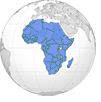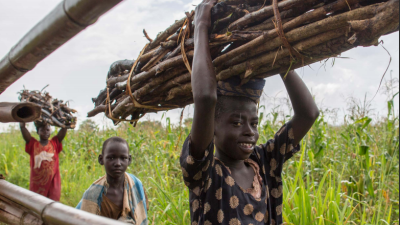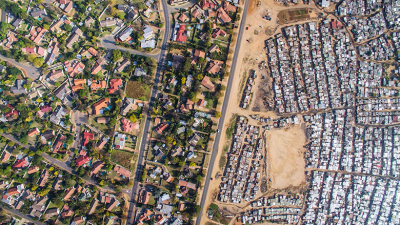What's in this section?
A number of countries in Africa - from upper-middle income countries, such as South Africa, to low income countries, such as Benin and Uganda - have conducted research into poverty using socially-perceived deprivation indicators. This research has found a high degree of consensus as to what is essential within each country and also considerable agreement as to what consitutes a minimum standard across countries. More countries to come in the near future.
The first ever of multidimensional poverty in Benin using the consensual or socially perceived necessities approach, found a high degree of consensus on the essentials for living in Benin. The needs of 33% of households were 'not satsified at all' for four or more of these essentials.
The government of Uganda has successfully introduced measures of multidimensional poverty based on socially-perceived necessities into its national household survey. The research finds high levels of deprivation and will help target resources to where needed.
A common view exists about what is required for an acceptable standard of living in South Africa despite significant social, racial and economic inequalities. This standard is above that which much of the population obtains.
Is there agreement on a minimally acceptable living standard in West Africa?
Research into what is regards as essential in five Western African countries suggests that there is considerable agreement as to what might form part of a minimum living standard. Marco Pomati and Shailen Nandy examined data from national surveys in Benin (in 2006), Liberia (in 2010), Mali (in 2006), Guinea (in 2007) and Gabon (in 2005). Items from the following categories were covered: consumption, food, health, school and work, transport and basic services (water and electricity). The consumption items were:
- Having at least two pairs of shoes
- Having a radio
- Having a home (as tenant or owner)
- Having at least two clothes to change
- Having furniture (tables and beds) in the house
- Able to buy a television
The food items were:
- Eating meat or fish every day
- Eating vegetables every day
- Eat three meals a day
- Eat cereals or tubers daily
- A good meal on holidays (Sundays, ceremonies etc)
The health items were:
- Able to take care of one’s body (soap, hair stylists etc)
- Able to heal when you are sick
- Not having too many children (to control fertility)
The school and work items were:
- The ability to send children to school
- Having a stable and sustainable work
The transport items were:
- Having personal means of transport (motorcycle, bicycle)
- Able to take the bus (or equivalent) to work
- Able to take a taxi if necessary (emergencies)
The water and electricity items were:
- Having access to water and electricity
- Having access to electricity
- Having access to drinking water
Not every item was covered in each country but respondents in all countries were asked about at least one from each category.
The study found that at the national level across each of the countries, there is consensus (using a 50%). In most instances there is near unanimous agreement about what items and activities contribute to a minimum standard of living. Over 70% of respondents report that all of these items are necessities. The single exception is Gabon, where less than 50% reported that being able to eat cereals/tubers/rice every day was not necessary. However, more than 50% in Gabon agreed that they should be able to afford vegetables or meat or fish every day, and more than 80% of respondents in all five countries believed they should be able to afford three meals a day every day.
This research suggests that in these west African countries, people’s view of what is essential go beyond basic needs. The importance of celebrations and the ability to take part in customary social activities (e.g. having a good meal on special occasions, being able to afford toiletries and other personal care items) are all seen as essential across all countries. There is also a demand for food security measures which go beyond detecting undernourishment in the household.
Overall, the analysis demonstrates a high degree of consensus and agreement about what constitutes a minimum standard of living.
For full details see: ‘Measuring Multidimensional Poverty According to National Definitions: Operationalising Target 1.2 of the Sustainable Development Goals’ (pdf), Marco Pomati and Shailen Nandy, Social Indicators research, September 2019, https://doi.org/10.1007/s11205-019-02198-6 . French Tranlation available here: 'Mesurer la pauvreté multidimensionnelle selon les définitions nationales : Mise en opérationde la cible 1.2 des objectifs de développement durable'.







 PSE:UK is a major collaboration between the University of Bristol, Heriot-Watt University, The Open University, Queen's University Belfast, University of Glasgow and the University of York working with the National Centre for Social Research and the Northern Ireland Statistics and Research Agency. ESRC Grant RES-060-25-0052.
PSE:UK is a major collaboration between the University of Bristol, Heriot-Watt University, The Open University, Queen's University Belfast, University of Glasgow and the University of York working with the National Centre for Social Research and the Northern Ireland Statistics and Research Agency. ESRC Grant RES-060-25-0052.






